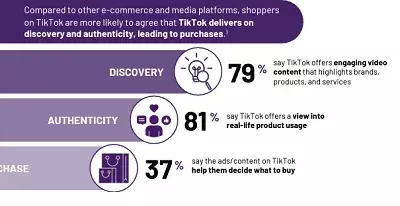In an era where social media platforms continuously evolve, TikTok’s potential removal from the U.S. market adds an intriguing layer to the debate surrounding its role in e-commerce. Recently, TikTok collaborates with Ipsos to release a survey that reveals how U.S. users engage with the app not only for entertainment but also as a tool for product discovery and shopping. This development arrives at a critical juncture, as discussions over the app’s future intensify due to government pressures. Significantly, the findings from the report could hold considerable implications for retailers in the U.S. market, should TikTok persist in maintaining its foothold.
The survey in question gathered responses from 3,876 U.S. internet users, shedding light on TikTok’s evolution into an e-commerce platform. Central to the findings is TikTok’s effectiveness as a product discovery engine. Users find value in the recommendations from creators on the platform, which enables them to connect with products that may not be easily discoverable elsewhere. The vibrant ecosystem of TikTok allows for dynamic engagement through videos and commentary, significantly impacting users’ shopping behavior.
The report highlights a critical differentiation point: TikTok appears to exhibit advantages over traditional e-commerce platforms. Users find that the sense of community and trend-setting, driven by the creatives they follow, impacts their purchasing decisions more markedly than on other platforms. This distinct angle could be beneficial for brands looking to leverage influencers and content creators to resonate with potential customers.
Moreover, the report underscores a noteworthy uptick in purchasing behaviors among users who engage with TikTok’s shopping features. While TikTok has not yet become a dominant e-commerce platform comparable to its Chinese counterpart, where shopping is deeply integrated into the user experience, there is undeniable growth in engagement and spending within the app. Users are gradually becoming more comfortable with purchasing products through TikTok listings, which suggests a growing familiarity and potential dependency on the platform for shopping.
The sentiment analysis indicates a fluctuating landscape in user attitudes towards TikTok as a shopping venue. Compared to other platforms, TikTok shows promise by offering a more engaging and visual shopping experience. Shopping behaviors are not only changing but are increasingly being influenced by the latest trends and product endorsements showcased by popular creators, laying the groundwork for TikTok to emerge as a formidable player in the e-commerce domain.
Future Implications for Retailers
For retailers looking to navigate the digital marketplace effectively, TikTok presents a fresh avenue for sales and marketing strategies. As the report provides insights on leveraging TikTok for commercial purposes, more businesses may need to reconsider their marketing tactics to harness the power of this platform. The document outlines tactical approaches that retailers can take to integrate TikTok into their sales strategies, including partnerships with influencers and utilizing immersive advertising techniques that resonate with the TikTok audience.
However, the uncertain future of TikTok amidst impending government regulations raises questions about the viability of these insights. If TikTok does face removal from the U.S. market, the value of the report could diminish significantly, leaving retailers and businesses with a looming sense of lost opportunity and retroactive analysis— a stark reminder of how regulatory pressures can impact market behaviors.
As the landscape remains fraught with ambiguity, the insights drawn from TikTok’s report serve as both a guiding light and a cautionary tale for U.S. retailers. If the app is indeed allowed to stay and evolve in the U.S. market, the findings about product discovery, user sentiment, and purchasing behavior become pivotal, offering pathways for brands to innovate their marketing strategies. Nevertheless, the possibility of the app’s removal casts a shadow, leaving both users and businesses in a state of uncertainty. As the narrative develops, one thing remains clear: the intricate relationship between social media platforms like TikTok and e-commerce continues to flourish and warrants close scrutiny.

